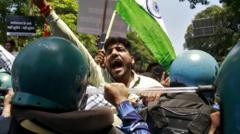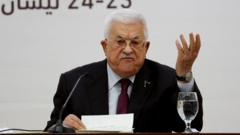In the wake of a revolution that removed an autocratic leader, student activists in Bangladesh have founded the National Citizens Party, led by Nahid Islam, to amplify their voices in the nascent democratic landscape.
Emergence of a New Political Force: Bangladesh's Student Leaders Establish National Citizens Party

Emergence of a New Political Force: Bangladesh's Student Leaders Establish National Citizens Party
Former student leaders from last year's revolution in Bangladesh are stepping away from the interim government to launch a new centrist political party, raising hopes for democratic engagement.
In a historic shift towards political engagement, student leaders from Bangladesh's 2024 uprising have announced the formation of the National Citizens Party, stepping away from their roles in the interim government. At a rally in Dhaka, the group officially introduced their party, which aims to adopt a centrist ideology and focus on rallying the student demographic that played a crucial role in their revolutionary protests.
Nahid Islam, a prominent figure in the protests that culminated in the ousting of former leader Sheikh Hasina, will spearhead the party. The 27-year-old activist, who had taken on responsibilities in the interim government led by Nobel laureate Muhammad Yunus, resigned this week to align more closely with the student body and work towards building an enduring political movement.
As Bangladesh anticipates free and fair elections—tentatively scheduled for December—the formation of the National Citizens Party aims to ensure that the voices of the youth are not lost amidst the political transition. An organization known as Students Against Discrimination, which represents many protesters, will maintain its nonpolitical stance as the new political landscape develops.
Despite the enthusiasm surrounding the new party, it is not without challenges. The Bangladesh Nationalist Party (BNP), now the largest political group following Hasina's ouster, has criticized the new party for having an undue advantage due to Islam's recent involvement in government. BNP leader Mirza Fakhrul Islam Alamgir expressed caution regarding the blending of party politics with government roles, indicating potential conflicts ahead.
While some former student leaders like Mahfuj Alam and Asif Mahmud remain committed to overseeing the democratic transition without party affiliation, the establishment of the National Citizens Party signals a significant step in Bangladesh's ongoing journey towards democracy, as these newly empowered students seek to elevate their influence in the political arena.




















